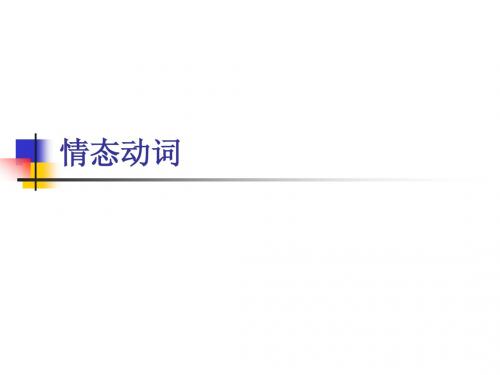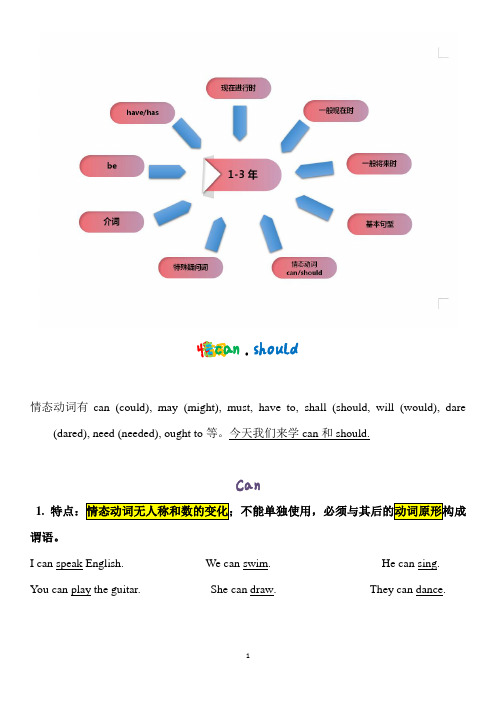情态动词can,should
- 格式:doc
- 大小:33.50 KB
- 文档页数:1

小升初常见情态动词用法归纳情态动词是英语中一个重要的语法概念,它用来表示说话人对某个动作或状态的态度、推测、命令、许可等。
了解和正确运用常见情态动词的用法对于学习英语至关重要。
在小升初考试中,情态动词的应用也是一个重要的考点。
本文将归纳总结小升初常见情态动词的基本用法,帮助同学们更好地掌握和运用。
一、can/could1. 表示能力和技能:- can表示现在或将来的能力,could表示过去的能力。
- can和could在肯定句中用来表达能力、掌握程度、技能等。
例如:I can swim.(我会游泳。
)2. 表示许可与请求:- can表示直接的许可,could表示委婉的许可。
- can和could在疑问句中用来提出请求或询问是否有许可。
例如:Can I go to the washroom?(我可以去洗手间吗?)3. 表示可能性:- can和could用来表示某种可能性。
- can表示一般的可能性,could表示一种更加虚拟的可能性。
例如:It can be true.(可能是真的。
)二、may/might1. 表示推测和猜测:- may和might用来表示对某种情况的推测和猜测。
- may表示一种更有把握的可能性,might表示一种更加不确定的可能性。
例如:He may be late.(他可能会晚到。
)2. 表示许可与请求:- may表示正式的许可,might表示委婉的许可。
- may和might在疑问句中用来提出请求或询问是否有许可。
例如:May I use your pen?(我可以用你的笔吗?)三、must1. 表示推测和肯定:- must用来表示对某种情况的推测和肯定。
- must表示说话人的判断或逻辑上的必然。
- must在疑问句中表示对应对方的情况感到惊异或不解。
例如:You must be tired.(你一定很累。
)2. 表示义务和必须:- must表示说话人的认定,有一种应当的意味。

八个情态动词提问及回答情态动词包括can, could, may, might, shall, should,will, would。
以下是一个以这些情态动词为标题的文章:Can we solve the climate crisis?Yes, we can. By taking collective action and making sustainable choices, we can work towards mitigating the effects of climate change.Could renewable energy be the solution?Yes, it could. Investing in and utilizing renewable energy sources such as solar and wind power could significantly reduce our reliance on fossil fuels.May we see a shift towards a greener economy?Yes, we may. As awareness of environmental issues grows, there is potential for a transition towards a moresustainable and eco-friendly economy.Might we be able to reverse the damage already done?Yes, we might. Through conservation efforts and restoration projects, it is possible to rehabilitate and rejuvenate ecosystems that have been impacted by human activity.Shall we prioritize environmental conservation?Yes, we shall. Protecting and preserving the environment should be a top priority for individuals, governments, and businesses alike.Should we educate future generations about environmental stewardship?Yes, we should. By teaching young people about the importance of environmental stewardship, we can ensure a more sustainable future for our planet.Will governments take decisive action on climate change?Yes, they will. With increasing pressure from citizens and global initiatives, governments are being pushed to implement policies and measures to address climate change.Would individual actions make a difference?Yes, they would. Every small action, from reducingsingle-use plastics to supporting sustainable businesses, contributes to the larger effort of combating climate change.。

情态动词can . should情态动词有can (could), may (might), must, have to, shall (should, will (would), dare (dared), need (needed), ought to等。
今天我们来学can和should.Can1. 特点:情态动词无人称和数的变化;不能单独使用,必须与其后的动词原形构成谓语。
I can speak English. We can swim. He can sing. You can play the guitar. She can draw. They can dance.2.概念:1)表示能力(体力、知识、技能)。
e.g. Can you lift this heavy box? 你能举起这个大盒子吗?(体力)Mary can speak three languages. 玛丽能说三种语言。
(知识)Can you skate?你能滑冰吗?(技能)2)表示请求和允许。
--Can I go now? -- Yes, you can. / No, you can’t.3)表示客观可能性(客观原因形成的能力)。
e.g. They’ve changed the timetable, so we can go by bus instead.This hall can hold 500 people at least. 这个大厅至少能容纳500人。
4)表示推测(惊讶、怀疑、不相信的态度),用于疑问句、否定句和感叹句中。
e.g. Can this be true?This can’t be done by him.How can this be true?3.变否定句直接在can后加“not”I can not speak English. We can not swim. He can not sing.You can not play the guitar. She can not draw. They can not dance.4.变一般疑问句直接把can提前, 肯定回答用yes, 否定回答用no.例Can you speak English? Yes, I can. /No, I can’t.Can you play the guitar? Yes, we can. / No, we can’t.Can she draw? Yes, she can. /No, she can’t.Can he sing? Yes, he can./ No, he can’t.Can they dance? Yes, they can./ No, they can’t.总结:情态动词can,后面总是接动词原形,没有人称和数的变化.意思是”能,会”.情动can表能力, 和行为动词不分离.不管主语如何变, can的模样永不变.只要出现情动can, 动词原形后面站.一般疑问can提前, 否定can后not添.Should1.should表示义务或责任建议或劝告。

情态动词的推测程度情态动词是英语中一类特殊的动词,用来表示说话者对某种动作或状态的态度、意愿、推测等。
推测是情态动词的一个重要意义之一。
本文将探讨情态动词在推测程度上的使用和表达,以帮助读者更好地理解和运用情态动词。
一、情态动词的概念情态动词是用来表示说话者的态度、意愿、能力等情态的一类动词,常见的情态动词有can, could, may, might, must, shall, should, will, would 等。
在英语中,情态动词通常用来表达说话者对某种动作或状态的推测程度。
二、推测程度的表达方式1. 对现在的推测程度情态动词can, could, may, might, must等可以用来表达对现在事实或情况的推测程度。
例如:- She must be at home.(她一定在家。
)- It may rain tomorrow.(明天可能会下雨。
)2. 对过去的推测程度对过去的事实或情况的推测程度通常使用情态动词must, might, could等进行表达。
例如:- He must have missed the bus.(他一定错过了公交车。
)- They might have already left.(他们可能已经离开了。
)3. 对将来的推测程度情态动词will, may, might等可以用来表达对将来情况的推测程度。
例如:- It will rain tomorrow.(明天会下雨。
)- They may come to the party tonight.(他们可能会来参加今晚的聚会。
)4. 对能力和可能性的推测情态动词can, could, may, might等还可以用来表达对某人的能力或可能性的推测程度。
例如:- He can speak three languages.(他会说三种语言。
)- It could be true.(这可能是真的。
)5. 对推测程度的强调和加强有时为了强调推测程度,我们可以使用情态动词的强调形式,如must, can’t, couldn’t等。


情态动词can . should情态动词有can (could), may (might), must, have to, shall (should, will (would), dare (dared), need (needed), ought to等。
今天我们来学can和should.Can1.谓语。
I can speak English. We can swim. He can sing.You can play the guitar. She can draw. They can dance.2.概念:1)表示能力(体力、知识、技能)。
e.g. Can you lift this heavy box? 你能举起这个大盒子吗?(体力)Mary can speak three languages. 玛丽能说三种语言。
(知识)Can you skate?你能滑冰吗?(技能)2)表示请求和允许。
--Can I go now? -- Yes, you can. / No, you can’t.3)表示客观可能性(客观原因形成的能力)。
e.g. They’ve changed the timetable, so we can go by bus instead.This hall can hold 500 people at least. 这个大厅至少能容纳500人。
4)表示推测(惊讶、怀疑、不相信的态度),用于疑问句、否定句和感叹句中。
e.g. Can this be true?This can’t be done by him.How can this be true?3.变否定句直接在can后加“not”I can not speak English. We can not swim. He can not sing.You can not play the guitar. She can not draw. They can not dance.4.变一般疑问句直接把can提前, 肯定回答用yes, 否定回答用no.例Can you speak English? Yes, I can. /No, I can’t.Can you play the guitar? Yes, we can. / No, we can’t.Can she draw? Yes, she can. /No, she can’t.Can he sing? Yes, he can./ No, he can’t.Can they dance? Yes, they can./ No, they can’t.总结:情态动词can ,后面总是接动词原形,没有人称和数的变化.意思是”能,会”.情动can 表能力, 和行为动词不分离.不管主语如何变, can 的模样永不变.只要出现情动can, 动词原形后面站.一般疑问can 提前, 否定can 后not 添.Should1.should 表示义务或责任建议或劝告。
情态动词⽤法及区别情态动词⽤法及区别(⼀)、情态动词can、could、may情态动词是表⽰说话⼈的某种感情或语⽓的动词,⽤来表⽰请求、允诺、愿望、建议、命令、能⼒、需求或拒绝等情感态度,常⽤的情态动词有:can、could、may、might、need、dare、ought to、will、would、shall、should等○1情态动词can表⽰现在的能⼒,could 表⽰过去的某种能⼒,如:He can speak good EnglishSandy cannot danceThe old man could swim across the river when he was young注意:我们可以⽤be able to 来表⽰能⼒,be 动词的形式根据句⼦所⽤时态变化我们可以⽤情态动词may、could、can来表⽰许可○2情态动词could 表⽰⼀种委婉的语⽓,⽐⽤can 更有礼貌,may较正式。
如:Can I use your pen?Could we picnic here?May I see the letter?拓展:1、情态动词的⽤法:○1情态动词有⼀定的词义,但不能单独做谓语,必须与实义动词或连系动词连⽤,构成谓语。
如:Can I have a look at your photo?You may take whatever you like○2情态动词⼀般⽆⼈称和数的变化,如:We must stay in the classroom有些过去式不代表过去。
如:You might be rightI would like to have a talk with you○4情态动词后接动词原形,即不带to的不定式。
如:She may lose her way○5情态动词具有助动词的作⽤,可⽤来构成否定句、疑问句及⽤于简略回答。
如:Can you sing English songs?Yes ,I can2、常⽤情态动词的⽤法:May的⽤法:○1表⽰允许或征询对⽅许可,有“可以”的意思。
情态动词can, could, may, might, will, would, shall, should, must, can’t 等的用法。
1) can /couldJin can speak English well. (ability)Could you please show me the way to Beihai Park? (request)2) may /mightMay we see the awards for the teams? (permission; request)She might give you some new clothing. (possibility)3) will /wouldThe Spring Festival is the most fun. The whole family will come for dinner. (promise;agreement)Often he would dress up like a rich man. (past habit; custom)4) shall /shouldThe harvest festival begins on Saturday. We shall be there with our friends. (promise;agreement)You should arrive at the airport two hours before he goes. (advice)5) must /can’tWang Feng wins an award every year. He must be very strong (speculation)You must be joking. That can’t be true. (guessing)Teaching procedure:Period 1.Contents: Warming up & reading comprehensionStep 1.Warming upAim: Make students get to know something about water.Step 2. Pre-reading1.Show some pictures of making electricity, irritating in agriculture, transport by ships, etc,.2. group work:How is the water being used?Step 3. While-reading1.Scanning: Ss read scan the bold words in the passage and understand the structure of the passage.How many parts are there in the passage?2.Ss read and get the main ideas of each part.Part 1(para1): the properties of water;Part2(Para2): chemical structure of water---H2OPart3(Para3): salinity----- the percentage of salt.Part4(Para4): DensityPart5(Para5): heat capacityPart6(Para6-7) Ocean motionStep 4. After-readingFinish the post-reading Ex on P21.Step 5. Assignment1. surf the internet and get more information about water and ocean using search engines like yahoo or baidu. ( or just input the key words like Jules Verne into the address column of IE)2. discussion:What will you prepare for writing an explanation of corals?After discussion, work out an outline.Period 2.Contents: difficulties in the passage.Step 1. Warming upAsk some Ss to present their homework.Step 2. Learning about the language:Play the tape for students to follow.Teacher explain some language points in the text on page 19--20.1. Who benefits from using water in this way?Benefit…from/ by…This song reminds me of France.Remind me to answer the letter.I reminded her that the book would cost her much.2. Life in the oceans ranges from the tiniest plankton all the way to giant like sharks andwhales.Range from… to…/ range between …. And…. 意为“从。
情态动词在疑问句中的用法详解情态动词是英语中的一类特殊动词,它们用来表达说话人的意愿、能力、推测、可能性等情态。
在疑问句中,情态动词的用法有一些特殊之处。
本文将详细解析情态动词在疑问句中的用法,帮助读者更好地理解和运用这些动词。
一、情态动词的基本概述情态动词包括can、could、may、might、must、shall、should、will、would、ought to等。
它们具有一定的共同特点,如一般情态动词后面接动词原形,具有否定形式和过去式形式的变化规律等。
在疑问句中,情态动词的用法会有所不同。
二、情态动词在一般疑问句中的用法1. Can/Could:用于表示能力或允许的情态动词。
在一般疑问句中,可以直接将can/could提到句首,构成疑问句,即“Can/Could 主语动词原形?”例如:“Can you swim?”(你会游泳吗?)2. May/Might:用于表示允许、可能性的情态动词。
在一般疑问句中,可以直接将may/might提到句首,构成疑问句,即“May/Might 主语动词原形?”例如:“May I borrow your pen?”(我可以借你的钢笔吗?)3. Must:用于表示必须、推测的情态动词。
在一般疑问句中,可以直接将must提到句首,并在句末加上否定词not,构成疑问句,即“Must 主语动词原形?”例如:“Must I finish the project today?”(我必须今天完成这个项目吗?)4. Shall/Should:用于表示建议、意图的情态动词。
在一般疑问句中,可以直接将shall/should提到句首,构成疑问句,即“Shall/Should 主语动词原形?”例如:“Shall we go to the park tomorrow?”(明天我们去公园好吗?)5. Will/Would:用于表示意愿、请求的情态动词。
在一般疑问句中,可以直接将will/would提到句首,构成疑问句,即“Will/Would 主语动词原形?”例如:“Will you help me with my homework?”(你能帮我做作业吗?)6. Ought to:用于表示应该、责任的情态动词。
情态动词can,should的用法
一、can (过去式could)
1) 表示能力(体力、知识、技能)
Can you lift this heavy box?
Mary can speak three languages.
Can you skate?
2) 表示请求和允许
--Can I go now?
-- Yes, you can. / No, you can’t.
3) 表示客观可能性(客观原因形成的能力)
They’ve changed the timetable, so we can go by bus instead.
This hall can hold 500 people at least.
4) 表示推测(惊讶、怀疑、不相信的态度),用于疑问句、否定句和感叹句中。
Can this be true?
How can this be true?
二、should
1) 表示劝告、建议和命令,译为“应该”。
I should help her because she is in trouble.
You should go to school right away.
Should I open the window?
2) 表示推测
should(客观推测,“可能”), must (主观推测,“一定”)。
He must be home. (断定他在家)
He should be home.(不太肯定)。